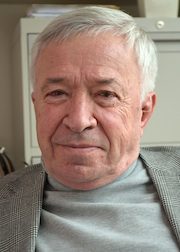Molchanov Named American Mathematical Society Fellow

 UNC Charlotte’s Stanislav (Stas) A. Molchanov, a faculty member in the Department of Mathematics and Statistics, is among the mathematicians who have been named to the 2013 prestigious inaugural class of American Mathematical Society Fellows.
UNC Charlotte’s Stanislav (Stas) A. Molchanov, a faculty member in the Department of Mathematics and Statistics, is among the mathematicians who have been named to the 2013 prestigious inaugural class of American Mathematical Society Fellows.
“We are very proud of this recognition honoring Dr. Molchanov’s outstanding scholarship and position as a noted researcher in mathematics,” said Nancy A. Gutierrez, dean of the College of Liberal Arts & Sciences at UNC Charlotte.
“Dr. Molchanov has contributed significantly to the discipline, particularly in probability and stochastic processes,” Gutierrez said. “His scholarly output is prolific, with hundreds of publications and dozens of presentations worldwide.” He has made presentations at academic conferences in Russia, Germany, Japan, Canada, Israel and other countries, and also has been a visiting faculty member in many countries, she said.
“In addition to the impact of his research, his energy and enthusiasm have long inspired his students,” she said. “Throughout his career, he has supervised over 100 master’s degree students and over 50 students who have received their doctoral degrees, including close to a dozen at UNC Charlotte.”
Molchanov received his first doctoral degree (Candidate of Sciences) in 1967 and his second (Doctor of Sciences) in 1982 from Moscow State University. While at MSU, his graduate supervisor was Eugene Dynkin, an internationally renowned mathematician. Before coming to UNC Charlotte in 1994, Molchanov was a faculty member at Moscow State University.
“I was invited here mainly in the Ph.D. program,” Molchanov said. He has stayed in touch with several of his former Ph.D. students; some work in industry and others work in academia, he said. He also has helped organized major conferences to advance mathematics.
His primary research areas are:
- Markov processes – geometrical approach (Martin boundaries, diffusion on the Riemannian manifolds.)
- Spectral theory – localization in random media, spectral properties of the Riemannian manifolds.
- Physical processes and fields in disordered structures – averaging, intermittency with applications to geophysics, astrophysics and oceanography.
- Wave processes in periodic and random media, quantum graphs, applications to optics.
The Fellows of the American Mathematical Society program recognizes members who have made outstanding contributions to the creation, exposition, advancement, communication, and utilization of mathematics. This inaugural class of 1,119 Fellows represents over 600 institutions. AMS has 30,000 members and was founded in 1888.
“The AMS is the world’s largest and most influential society dedicated to mathematical research, scholarship, and education,” AMS President Eric M. Friedlander said. “Recent advances in mathematics include solutions to age-old problems and key applications useful for society. The new AMS Fellows Program recognizes some of the most accomplished mathematicians, AMS members who have contributed to our understanding of deep and important mathematical questions, to applications throughout the scientific world, and to educational excellence.”